【华南理工大学2012年考研专业课真题】语言学和英美文学基础知识2012
- 格式:pdf
- 大小:64.46 KB
- 文档页数:7
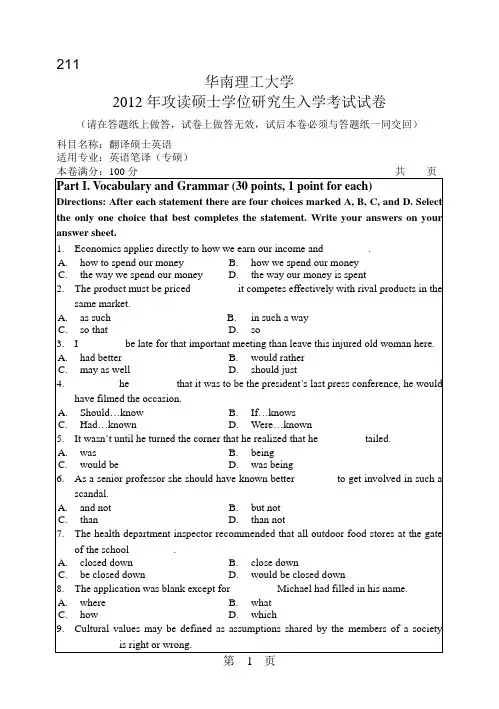
211华南理工大学2012年攻读硕士学位研究生入学考试试卷(请在答题纸上做答,试卷上做答无效,试后本卷必须与答题纸一同交回)科目名称:翻译硕士英语适用专业:英语笔译(专硕)本卷满分:100分共页Part I. Vocabulary and Grammar (30 points, 1 point for each)Directions: After each statement there are four choices marked A, B, C, and D. Select the only one choice that best completes the statement. Write your answers on your answer sheet.1.Economics applies directly to how we earn our income and ________.A. how to spend our moneyB. how we spend our moneyC. the way we spend our moneyD. the way our money is spent2.The product must be priced ________ it competes effectively with rival products in thesame market.A. as suchB. in such a wayC. so thatD. so3.I ________ be late for that important meeting than leave this injured old woman here.A. had betterB. would ratherC. may as wellD. should just4.________ he ________ that it was to be the president’s last press conference, he wouldhave filmed the occasion.A. Should…knowB. If…knowsC. Had…knownD. Were…known5.It wasn’t until he turned the corner that he realized that he ________ tailed.A. wasB. beingC. would beD. was being6.As a senior professor she should have known better _______ to get involved in such ascandal.A. and notB. but notC. thanD. than not7.The health department inspector recommended that all outdoor food stores at the gateof the school ________.A. closed downB. close downC. be closed downD. would be closed down8.The application was blank except for ________ Michael had filled in his name.A. whereB. whatC. howD. which9.Cultural values may be defined as assumptions shared by the members of a society________ is right or wrong.A. as to whatB. about whateverC. on whatD. concerning things that10.Some scientists think that trial-and-error methods help to show how intelligent________.A. is an animalB. an animal isC. will an animal beD. an animal will be11.We can’t _______ examinations altogether unless we can come up with a better way toevaluate the students.A. do awayB. do away ofC. do away withD. do away from12.The sudden bankruptcy of these financial giants threw the investors ________ andcaused them to ________.A. in a panic, stampedeB. in pain, panicC. in confusion, hold their stocksD. in despair, withdraw gradually13.He did everything possible to whip up some support for his decision to________ moremoney to his favorite project.A. allowB. spendC. divideD. allot14.At that time he kept telling us that final victory was just ________. His optimism savedus from despair.A. at the cornerB. around the cornerC. on the cornerD. in the corner15.If he should fail to ________ the project to a successful close in time, he would beseverely reprimanded.A. bringB. takeC. carryD. put16.After he ________ power, he was no longer satisfied to be a president. He wanted tobe a king.A. grippedB. grabbedC. seizedD. grasped17.His sudden blindness ________ him ________ the joy of seeing the beautiful world.A. robbed; ofB. deprived; withC. robbed; offD. denied; of18.This terrible event ________ of the president, and he ________ all his appointments.A. drew hold of; called offB. occupied all the attention;dismissedC. demanded all the attention; laid asideD. took complete hold; cancelled19.Starting around 7000 B.C., and for the next four thousand years, much of the NorthernHemisphere ____ temperatures warmer than at present.A. with experience ofB. experiencedC. experiencingD. experience20.The meeting took on a different ____after his moving speech.A. presageB. postureC. travestyD. trauma21.After ________ deliberation, the foreman announced that the jury had reached averdict.A. 10-minutes ofB. 10 minutes ofC. 10 minute’sD. 10-minute22.________ is always the case, the darkest hour comes before the dawn.A. ThatB. ItC. AsD. What23.We have a long way to go ________ we can invent truly intelligent machines.A. beforeB. ifC. thatD. when24.Chocolate comes from cocoa beans, ________ the seeds of the cacao tree.A. that isB. that areC. which isD. which are25.I know she didn’t pass the qualifying exam, but really she’s ________ but stupid.A. anyB. nothingC. anythingD. something26.Even though we may not notice them, computers are all around us and affect manyparts of our ________ life.A. every dayB. everydayC. every day’sD. everyday’s27.Because we are by nature social animals, we need other people ________ we needfood, water and shelter.A. such asB. just asC. as suchD. as if28.If inflation continues to rise at the present rate, ten percent of the population ________hard to make ends meet.A. would findB. found itC. findsD. will find it29.She spoke for the ________ that they three had all lost the ________ to work duringthe spring break and they needed a good long rest.A. team; desireB. group; interestC. company; inclinationD. gang; intention30.Only hotel guests have the ________ of using the private beach.A. occasionB. possibilityC. privilegeD. allowancePart II. Reading Comprehension (40 points)Section 1 Multiple choice questions (16points, 2 points for each)Directions: In this section there are 2 reading passages followed by multiple-choice questions. Read the passages and then write your answers on your answer sheet. Passage 1“Can we speak of the death of the university?” an English newspaper recently asked. Another offered the diagnosis: “Still breathing”. Not only at this seminar, here and now, but all over the world the future of the universities is now being discussed. This is not only because we are entering a new century. Many people are asking whether the traditional research universities in fact have any future at all. This doubt seems mainly due to the development of the new technology, the massification of the universities, the idea of life-long learning, the growing competition from other learning institutions ⎯ and may also because of the strong specialization that we are now experiencing in most fields of research. Many experts predict the death of universities as we know them today, with a campus.I am an optimist, and I have become even more of an optimist having listened to the speakers today. I believe in the magic of the campus! I believe that the universities will be able to enjoy a very bright future as intellectual power centers in a world in which society is calling out increasingly loudly for more knowledge.But if we are to continue to live as intellectual power centers, the universities cannot sit passively letting development take their course. We must know what sort of university we want in the future. Many battles have been lost because of the lack of any goal. We must also have a strategy and a policy for how we are to achieve our vision. This means that the university must actively relate to the great challenges we are now being faced with, and we must develop our ability and will for renewal. Yet we must do this at the same time as we stand by the fundamental values that make us a university: that is our independence.I see it as one of the most important tasks for a university president to work for the greatest possible spirit of community in the university, and for the university to be an integrated institution and not simply a number of facilities or departments linked together in some kind of formal organization or strategic alliance. Only then can we defend the use of the name “university”.31. According to the first paragraph, the traditional research universities ________.A. have a very bright future before themB. are faced with a very difficult situationC. are becoming a hot topic of all kinds of peopleD. are about to disappear from people’s vision32. In the author’s opinion, people are worried about the future of the universities becauseof the following reasons EXCEPT ________.A. there is strong competition from other educational institutionsB. universities cannot obtain enough financial backupC. a lot of research fields are thought to be too much specializedD. many universities have been established33. The author is optimistic about the future of universities because ________.A. he has listened to many speakersB. he thinks that universities are powerfulC. universities can satisfy the growing need of society for more knowledgeD. he thinks universities can work magic by themselves34. We can infer from the passage that it is a ________.A. report intended for government officialsB. research paper concerning educational policiesC. speech delivered at a meetingD. lecture by a professor to his students35. Which of the following statements is NOT mentioned in the passage?A. The faculties and departments in the universities should maintain their ownindependence.B. Universities must take the initiative to develop themselves.C. In order to survive, universities must meet the challenges and solve the difficulties infront of them.D. Lack of proper plans may lead to the failure of many projects.Passage 2Prices determine how resources are to be used. They are also the means by which products and services that are in limited supply are rationed among buyers. The price system of the United States is a very complex network composed of the prices of all the products bought and sold in the economy as well as those of a myriad of services, including labor, professional transportation, and public-utility services. The interrelationships of all these prices make up the "system" of prices. The price of any particular product of service is linked to a broad, complicated system of prices in which everything seems to depend more or less upon everything else. If one were to ask a group of randomly selected individuals to define "price", many would reply that price is an amount of money paid by the buyer to the seller of a product or service or, in other words, that price is the money value of a product or service as agreed upon in a market transaction. This definition is, of course, valid as far as it goes. For a complete understanding of a price in any particulartransaction, much more than the amount of money involved must be known. Both the buyer and the seller should be familiar with not only the money amount, but with the amount and quality of the product or service to be exchanged, the time and place at which the exchange will take place and payment will be made, the form of money to be used, the credit terms and discounts that supply to the transaction, guarantees on the product or service, delivery terms return privileges, and other factors. In other words, both buyer and seller should be fully aware of all the factors that comprise the total "package" being exchanged for the asked—— for amount of money in order that they may evaluate a given price.36. According to the passage, the price system is related primarily to _______.A. labor and educationB. transportation and insuranceC. utilities and repairsD. products and services37. According to the passage, which of the following is NOT a factor in completeunderstanding of price?A. Instructions that come with a product.B. The quantity of a product.C. The quality of a product.D. Warranties that cover a product.38. The paragraph following the passage most likely discusses _______.A. unusual ways to advertise productsB. types of payment plans for serviceC. theories about how products affect different levels of societyD. how certain elements of price "package" influence its market valueSection 2 Answering questions (24 points, 2 points for each)Directions: Read the following passage and then answer IN COMPLETE SENTENCES the questions following it. Use the only information from the passage you have read and write your answers in the corresponding space on your ANSWER SHEET.Passage 3[1]Put a jaguar, a bear, a tiger and a panda together and you might get a good show but you won’t get a quiet life.[2]The Bric grouping---Brazil, Russia, India and China---has become a shorthand for the rise of emerging markets in the global economy. And after a rather stellar decade, the Brics mainly had a good crisis from which they are now rapidly exiting.[3]Goldman Sachs, the financial group that invented the category, reckons that China may well become the world’s largest economy before 2030. Collectively, the Bric economies could well surpass output in the Group of Seven wealthy nations---which have dominated the management of the global economy---by 2032.[4]The brics already have a bigger share of world trade than the US. China, probably the world’s biggest goods exporter last year, has been supplemented by India’s software and back-office exports, Russia’s oil and gas and the domination of a number of agricultural commodity markets by Brazil’s super-competitive farmers.[5]While equities in G7 countries were struggling to stay in positive territory during the past five or so years, the Bric share prices, albeit with a steep drop and rapid recovery during the global financial crisis, finished the decade more than twice as high as in 2005. Bric equity indices have emerged; Bric funds have sprung up for investors to pile into the sector.[6]So as the world emerges from recession, is this a transformational moment when the center of gravity in the global economy and its governance decisively shifts? Is this a pivot point such as the second world war, where the confident, innovative US muscled aside the weakened, debt-laden economies of Europe and remade the global financial architecture? And, most immediately, are Bric consumers up to the task of rebalancing the world economy by supplanting their acquisitive American counterparts?[7]The most likely answer is: not yet. Not only are the Brics such a disparate group that almost any generalization is problematic, but China, the dominant member of the quartet, still seems wedded to an economic model dependent on demand elsewhere.[8] “The so-called emerging economies, even some like Bangladesh, are undoubtedly players on the global stage,” said Jean-Pierre Lehmann, professor of political economy at the IMD management school in Lausanne, Switzerland. “But I don’t see any great cataclysm in the next 10 years, nor the center of finance definitely moving east.”[9]Like a boy band or a street gang, the Brics might almost have been chosen for their disparate abilities rather than their similarities. China’s size and openness to trade give it as much economic clout as the rest put together: Markus Jager, of Deutsche Bank, calls the hypercompetitive manufacturing exporter “the 800lb panda in the room” . India, similar in population but poorer and economically more insular, is chiefly notable to investors and trading patterns for its software and business services. Brazil, despite a sprinkling of manufactures, remains one of the world’s most efficient agro-exporters; Russia, after feebler attempts to diversify, essentially just sells oil and gas.[10]The story of their rapid progress is familiar but still dramatic. A decade ago, only one had an investment-grade credit ratting; now all do. Only 12 years ago, a Russian debt default and Brazilian currency crisis rocked the world economy; today, they have accumulated vast foreign exchange reserves.[11]The Brics contributed about half of global growth between 2000---2008 sharply higher than in the previous decade. Yet along with this growth has come an unbalancing of the global economy.[12]A Chinese growth model based on heavy investment and exports has accompanied vast current-account surplus across east Asia, matched by a current-account deficit in the US. And despite doings its bit to keep economic growth going during the crisis, it is far from clear that the Middle Kingdom has effected a shift towards consumer demand that a true engine of world growth would achieve.[13]With a great flourish, Beijing announced a $585bn stimulus package in November2008 and loosened bank credit. But its ability to create self-sustaining growth was suspect. Rather than handing out cash to consumers to get them spending---a move that might also have encouraged imports---a large chunk of the stimulus went into the old favorite, fixed investment. “If global demand does not recover in time or the stimulus measures fail to stir the animal spirits, China may end up creating overcapacity,” said Jagar.[14]Razeen Sally, a trade expert at the London School of Economics, said: “The Chinese interventions had the effect of reinforcing existing problems and imbalances. We are going to see a lot of excess capacity in export-oriented industries like steel at exactly the wrong time.”[15]The repegging of the renminbi against the dollar in 2008, after three years when it was allowed to crawl higher, has also done nothing to shift the Chinese economy from exports to consumer demand. The effect of that decision is multiplied by the copycat actions of many emerging-market countries holding their own currencies down lest they lose competitiveness to China.[16]Indeed, although the worldwide reduction in consumer demand had cut the absolute level of China’s current-account surplus during the crisis, with fewer ships carrying toys and iPods out of Shenzhen and Shanghai, China continued to gain market share abroad. The International Monetary Fund and others reckon that the apparent rebalancing of the global economy over the past year is temporary. When demand picks up, so will Chinese exports, along with the old surpluses and deficits.[17]Despite pockets of profligacy, if anything, China’s has become less rather than more of a consumer economy in the past decade. Its overall savings rate grew over the decade. Although much of this rise reflected corporate savings, household savings rose, too, and a greater share of national income went to companies rather than consumers in the first place.[18]A survey last year by the McKinsey Global Institute backed up what many economists have long argued: that the lack of a social safety net is one of the main reasons that Chinese households save. The top three reasons given were: educational needs, security in case of illness and caring for parents. Changing deep-seated structural factors such as this will not be quick. Nor will it be achieved simply by letting the renminbi rise.[19]As for the other Brics, whose trend growth rate is slower than China’s, they are unlikely to have a noticeable effect on global demand for some time. Although growth in Brazil and India held up well during the crisis, the former is a relatively mature economy with less scope for rapid growth; the latter an underperformer with a chronic public finance problem and a household savings rate even higher than China’s. Meanwhile, Russia, whose economy contracted sharply during the global recession, still depends on oil prices.[20]A decade of rapid growth is not enough for the Brics to seize the baton of global economic leadership from the US and western Europe. The grouping, or some of them, may have astonished the world with their progress over the past 10 years. But it will require a qualitative improvement as well as more growth to consolidate that shift of power.39. Find in paragraph[7] and any other paragraph two synonyms of “Brazil, Russia, India and China” as a group.40. What are the main reasons to group Brazil, Russia, India and China as a new economic category?41. Find a metonymy in paragraph[15] and a metaphor in paragraph[12].42. What is the particular reason for Chinese households to save money ?43. Why the consumer economy remained weak in China?44. In paragraph[5], what does “equity” mean?45. In paragraph[7], what is the inside meaning of “…that any generalization isproblematic” ?46. Paraphrase “China’s size and openness to trade give it as much economic clout as the rest put together”. (Paragraph [9])47. List two reasons for the statement “A decade of rapid growth is not enough for the Brics to seize the baton of global economic leadership from the US and western Europe”.48. Use one short sentence to summarize paragraph [6].49. What is strong with Brazil as one of the Brics?50. According to the article, do you see any great cataclysm in the next 10 years in terms of the center of finance?Part III. Writing (30 points)51. First read the following Chinese report, and then write an essay of about 400 words in English. You are supposed to have a title for your writing. Write your essay on your ANSWER SHEET.2011年10月13日下午5时30分许,一出惨剧发生在佛山南海黄岐广佛五金城:年仅两岁的女童小悦悦(本名王悦)走在巷子里,被一辆面包车两次碾压,几分钟后又被一小型货柜车碾过。
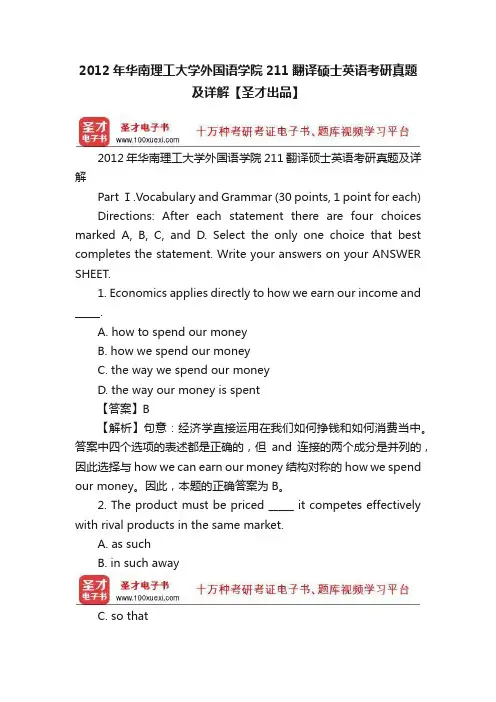
2012年华南理工大学外国语学院211翻译硕士英语考研真题及详解【圣才出品】2012年华南理工大学外国语学院211翻译硕士英语考研真题及详解Part Ⅰ.Vocabulary and Grammar (30 points, 1 point for each) Directions: After each statement there are four choices marked A, B, C, and D. Select the only one choice that best completes the statement. Write your answers on your ANSWER SHEET.1. Economics applies directly to how we earn our income and _____.A. how to spend our moneyB. how we spend our moneyC. the way we spend our moneyD. the way our money is spent【答案】B【解析】句意:经济学直接运用在我们如何挣钱和如何消费当中。
答案中四个选项的表述都是正确的,但and连接的两个成分是并列的,因此选择与how we can earn our money 结构对称的how we spend our money。
因此,本题的正确答案为B。
2. The product must be priced _____ it competes effectively with rival products in the same market.A. as suchB. in such awayC. so thatD. so【答案】C【解析】句意:这个产品必须要有合理的定价,这样的话它能在同类市场中有效地与对手的产品竞争。
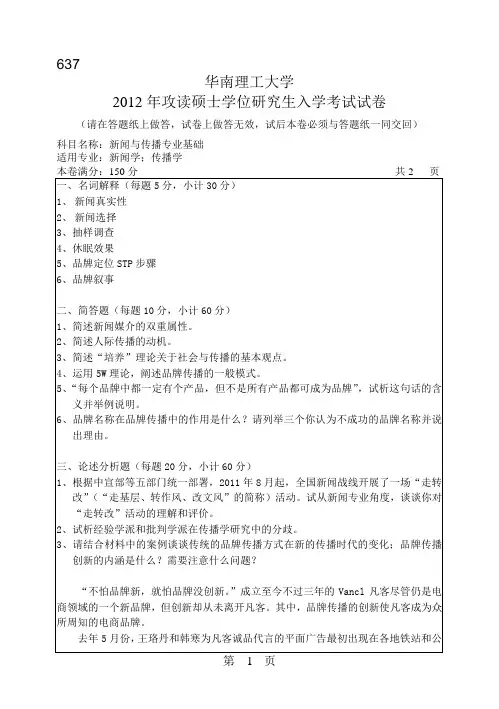
637华南理工大学2012年攻读硕士学位研究生入学考试试卷(请在答题纸上做答,试卷上做答无效,试后本卷必须与答题纸一同交回)科目名称:新闻与传播专业基础适用专业:新闻学;传播学本卷满分:150分共2 页一、 名词解释(每题5分,小计30分)1、新闻真实性2、新闻选择3、抽样调查4、休眠效果5、品牌定位STP步骤6、品牌叙事二、 简答题(每题10分,小计60分)1、简述新闻媒介的双重属性。
2、简述人际传播的动机。
3、简述“培养”理论关于社会与传播的基本观点。
4、运用5W理论,阐述品牌传播的一般模式。
5、“每个品牌中都一定有个产品,但不是所有产品都可成为品牌”,试析这句话的含义并举例说明。
6、品牌名称在品牌传播中的作用是什么?请列举三个你认为不成功的品牌名称并说出理由。
三、 论述分析题(每题20分,小计60分)1、根据中宣部等五部门统一部署,2011年8月起,全国新闻战线开展了一场“走转改”(“走基层、转作风、改文风”的简称)活动。
试从新闻专业角度,谈谈你对“走转改”活动的理解和评价。
2、试析经验学派和批判学派在传播学研究中的分歧。
3、请结合材料中的案例谈谈传统的品牌传播方式在新的传播时代的变化;品牌传播创新的内涵是什么?需要注意什么问题?“不怕品牌新,就怕品牌没创新。
”成立至今不过三年的Vancl凡客尽管仍是电商领域的一个新品牌,但创新却从未离开凡客。
其中,品牌传播的创新使凡客成为众所周知的电商品牌。
去年5月份,王珞丹和韩寒为凡客诚品代言的平面广告最初出现在各地铁站和公交站牌时,这只是一则再简单、普通不过的广告。
“我爱表演,不爱扮演……我没什么特别,我很特别;我和别人不一样,我和你一样,我是凡客”和“爱夜间大排档,爱赛车……我不是什么旗手,不是谁的代言,我是韩寒,我只代表我自己”。
后来,白底、人物抠图无背景,再加上“我爱XX,我不爱XX,我是XX,我不是XX,我和你们一样(不一样),我是XXX”的广告词模式风靡整个网络。
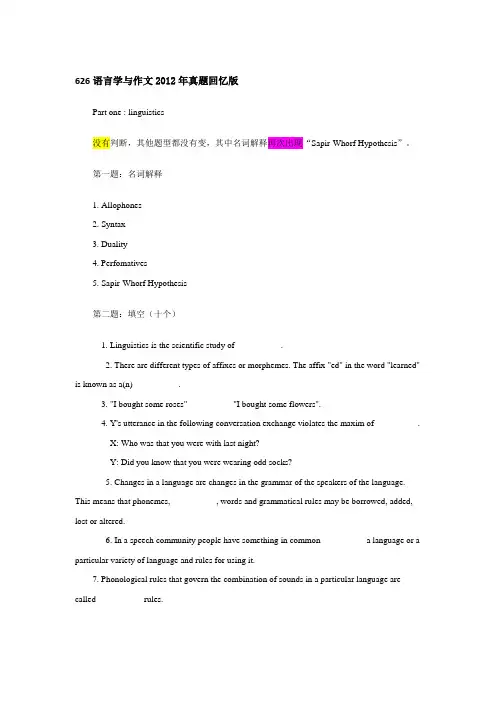
626语言学与作文2012年真题回忆版Part one : linguistics没有判断,其他题型都没有变,其中名词解释再次出现“Sapir-Whorf Hypothesis”。
第一题:名词解释1. Allophones2. Syntax3. Duality4. Perfomatives5. Sapir-Whorf Hypothesis第二题:填空(十个)1. Linguistics is the scientific study of __________.2. There are different types of affixes or morphemes. The affix "ed" in the word "learned" is known as a(n) __________.3. "I bought some roses" __________"I bought some flowers".4. Y's utterance in the following conversation exchange violates the maxim of__________.X: Who was that you were with last night?Y: Did you know that you were wearing odd socks?5. Changes in a language are changes in the grammar of the speakers of the language. This means that phonemes, __________, words and grammatical rules may be borrowed, added, lost or altered.6. In a speech community people have something in common __________a language or a particular variety of language and rules for using it.7. Phonological rules that govern the combination of sounds in a particular language are called __________ rules.8. An independent unit of meaning that can be used freely by itself is called a __________ morpheme.9. A __________ sentence contains two clauses joined by a linking word, such as "and", "but", "or".10. __________is the language that a learner constructs at a given stage of SLA.第三题:分析题:1. Imagine you were at a bus stop and two people approached you one after the other. Thefirst said“唉,几点了?”and the second said“不好意思,打搅一下,请问您带表了吗?”What assumptions would you make if you were addressed in these two ways and why would you make them?2. A sentence may be ambiguous.用所学理论画树状图分析句子含义,类似于下面含有歧义的句子“The mother of the boy and girl will arrive soon.”3. What are the possible contexts in which the given sentences can be used for other purposes than just stating facts?(1). The room is messy.(2). I can’t work under untidy circumstances.(3). It would be good if she had a green skirt on.4. 分析一下Grammar Translation Method与Communicative Language Teaching两种教学方法的区别。
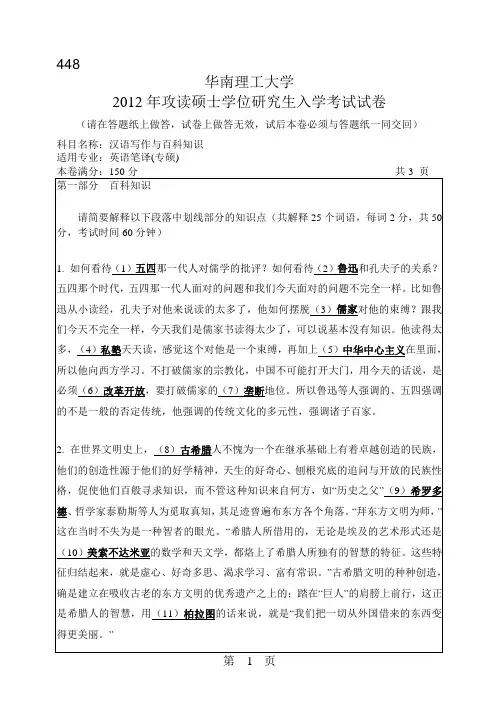
448华南理工大学2012年攻读硕士学位研究生入学考试试卷(请在答题纸上做答,试卷上做答无效,试后本卷必须与答题纸一同交回)科目名称:汉语写作与百科知识适用专业:英语笔译(专硕)本卷满分:150分共3 页第一部分百科知识请简要解释以下段落中划线部分的知识点(共解释25个词语,每词2分,共50分,考试时间60分钟)1. 如何看待(1)五四那一代人对儒学的批评?如何看待(2)鲁迅和孔夫子的关系?五四那个时代,五四那一代人面对的问题和我们今天面对的问题不完全一样。
比如鲁迅从小读经,孔夫子对他来说读的太多了,他如何摆脱(3)儒家对他的束缚?跟我们今天不完全一样,今天我们是儒家书读得太少了,可以说基本没有知识。
他读得太多,(4)私塾天天读,感觉这个对他是一个束缚,再加上(5)中华中心主义在里面,所以他向西方学习。
不打破儒家的宗教化,中国不可能打开大门,用今天的话说,是必须(6)改革开放,要打破儒家的(7)垄断地位。
所以鲁迅等人强调的、五四强调的不是一般的否定传统,他强调的传统文化的多元性,强调诸子百家。
2. 在世界文明史上,(8)古希腊人不愧为一个在继承基础上有着卓越创造的民族,他们的创造性源于他们的好学精神,天生的好奇心、刨根究底的追问与开放的民族性格,促使他们百般寻求知识,而不管这种知识来自何方,如“历史之父”(9)希罗多德、哲学家泰勒斯等人为觅取真知,其足迹曾遍布东方各个角落。
“拜东方文明为师,”这在当时不失为是一种智者的眼光。
“希腊人所借用的,无论是埃及的艺术形式还是(10)美索不达米亚的数学和天文学,都烙上了希腊人所独有的智慧的特征。
这些特征归结起来,就是虚心、好奇多思、渴求学习、富有常识。
”古希腊文明的种种创造,确是建立在吸收古老的东方文明的优秀遗产之上的;踏在“巨人”的肩膀上前行,这正是希腊人的智慧,用(11)柏拉图的话来说,就是“我们把一切从外国借来的东西变得更美丽。
”3. 国际(12)空间站计划的前身是美国国家航空航天局的自由空间站计划,这个计划是1980年代美国战略防御计划的一个组成部分。
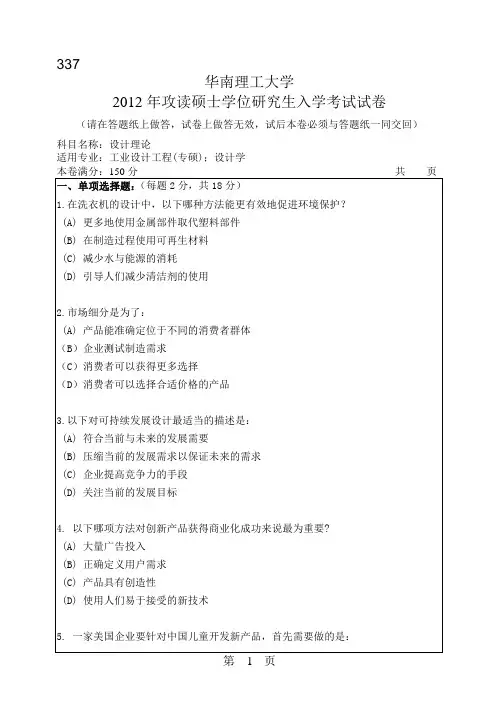
337华南理工大学2012年攻读硕士学位研究生入学考试试卷(请在答题纸上做答,试卷上做答无效,试后本卷必须与答题纸一同交回)科目名称:设计理论适用专业:工业设计工程(专硕);设计学本卷满分:150分共页一、 单项选择题:(每题2分,共18分)1.在洗衣机的设计中,以下哪种方法能更有效地促进环境保护?(A) 更多地使用金属部件取代塑料部件(B) 在制造过程使用可再生材料(C) 减少水与能源的消耗(D) 引导人们减少清洁剂的使用2.市场细分是为了:(A) 产品能准确定位于不同的消费者群体(B)企业测试制造需求(C)消费者可以获得更多选择(D)消费者可以选择合适价格的产品3.以下对可持续发展设计最适当的描述是:(A) 符合当前与未来的发展需要(B) 压缩当前的发展需求以保证未来的需求(C) 企业提高竞争力的手段(D) 关注当前的发展目标4. 以下哪项方法对创新产品获得商业化成功来说最为重要?(A) 大量广告投入(B) 正确定义用户需求(C) 产品具有创造性(D) 使用人们易于接受的新技术5. 一家美国企业要针对中国儿童开发新产品,首先需要做的是:(A) 聘请中国本土设计师(B)将设计人员派驻中国(C) 研究中国儿童的生活方式(D) 发展跨文化的设计概念6. 在设计概念产生的早期阶段,最有效的交流手段是:(A) 工程图纸(B) 功能模型(C) 设计效果图(D) 设计草图7. 评价一张平面招贴设计时,重点应考虑:(A) 版式、图形、色彩、字体是否美观(B) 信息是否有效地传达给目标受众(C) 是否节省印刷成本(D) 是否包含丰富的信息量8.以下哪组是形态学中对形态进行分类的恰当描述:(A)统一形态和变异形态(B)抽象形态和具象形态(C)几何形态和人工形态(D)自然形态和仿生形态9.为产品选择材料时,设计师应关注:(A) 材料的质量以及可选择的色彩(B) 材料的性能、成本、可持续发展因素以及加工特性(C) 材料可以在生产地获得(D) 材料的表面处理特性二、简答题:(每题9分,共45分)1.简述产品设计中三种常用的调查方法,并比较它们在新产品开发中的不同应用?2.简述色彩管理在设计管理中的应用?3.什么是通用性设计,简述通用性设计的主要设计原则?4.简述设计表达对设计思维活动的作用,工业设计师的设计表达方法包括哪些? 5.试列举三种形式美法则,并分别做简要说明?三、论述题:(1、2题各30分,3题27分,共87分)1.我国多个省市都已在中小学推广试用电子书包,其终端内置相关教育软件及资料,并能连接教育资源网络,取代了传统的书本:(1)从此例出发阐述技术对设计的影响?(2)试分析电子书包应关注的设计重点?2.近年来国内家庭购买私人汽车的速度增长很快,对于这种现象:(1)请分析轿车家庭化趋势对居民生活方式带来的变化?(2)在此基础上阐述未来家用交通工具的设计趋势?3.试论述系统观在设计中的应用,并作举例说明?。
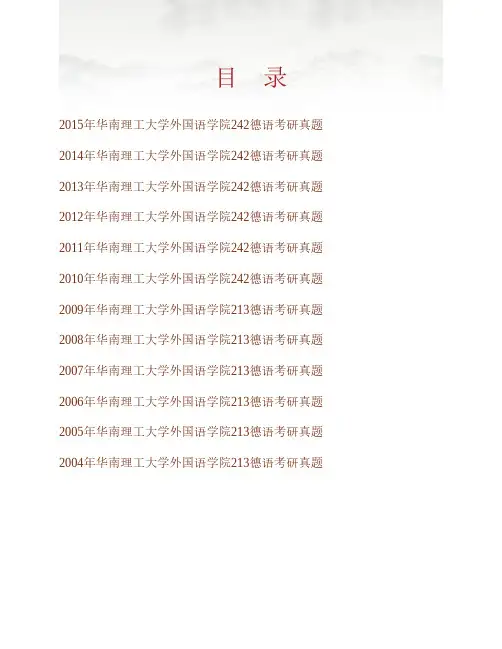
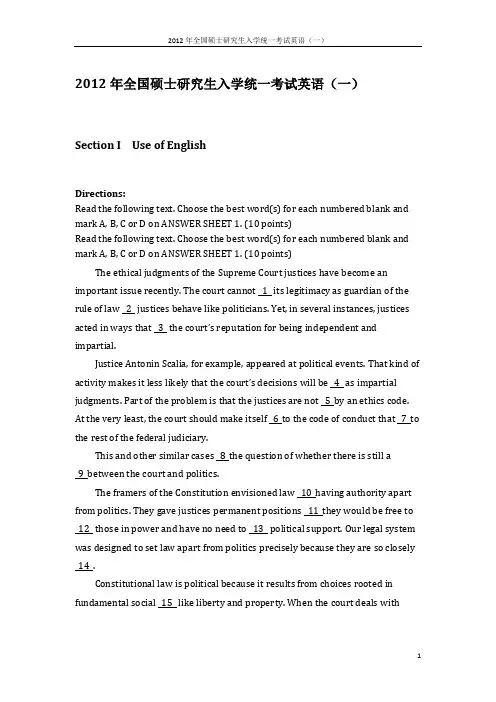
2012年全国硕士研究生入学统一考试英语(一)Section I Use of EnglishDirections:Read the following text. Choose the best word(s) for each numbered blank and mark A, B, C or D on ANSWER SHEET 1. (10 points)Read the following text. Choose the best word(s) for each numbered blank and mark A, B, C or D on ANSWER SHEET 1. (10 points)The ethical judgments of the Supreme Court justices have become animportant issue recently. The court cannot _1_ its legitimacy as guardian of therule of law _2_ justices behave like politicians. Yet, in several instances, justicesacted in ways that _3_ the court’s reputation for being independent andimpartial.Justice Antonin Scalia, for example, appeared at political events. That kind ofactivity makes it less likely that the court’s decisi ons will be _4_ as impartialjudgments. Part of the problem is that the justices are not _5_by an ethics code.At the very least, the court should make itself _6_to the code of conduct that _7_tothe rest of the federal judiciary.This and other similar cases _8_the question of whether there is still a_9_between the court and politics.The framers of the Constitution envisioned law _10_having authority apartfrom politics. They gave justices permanent positions _11_they would be free to_12_ those in power and have no need to _13_ political support. Our legal systemwas designed to set law apart from politics precisely because they are so closely_14_.Constitutional law is political because it results from choices rooted infundamental social _15_ like liberty and property. When the court deals withsocial policy decisions, the law it _16_ is inescapably political-which is why decisions split along ideological lines are so easily _17_ as unjust.The justices must _18_ doubts about the court’s legitimacy by making themselves _19_ to the code of conduct. That would make rulings more likely to be seen as separate from politics and, _20_, convincing as law.1. [A]emphasize [B]maintain [C]modify [D] recognize2. [A]when [B]lest [C]before [D] unless3. [A]restored [B]weakened [C]established [D] eliminated4. [A]challenged [B]compromised [C]suspected [D] accepted5. [A]advanced [B]caught [C]bound [D]founded6. [A]resistant [B]subject [C]immune [D]prone7. [A]resorts [B]sticks [C]loads [D]applies8. [A]evade [B]raise [C]deny [D]settle9. [A]line [B]barrier [C]similarity [D]conflict10. [A]by [B]as [C]though [D]towards11. [A]so [B]since [C]provided [D]though12. [A]serve [B]satisfy [C]upset [D]replace13. [A]confirm [B]express [C]cultivate [D]offer14. [A]guarded [B]followed [C]studied [D]tied15. [A]concepts [B]theories [C]divisions [D]conceptions16. [A]excludes [B]questions [C]shapes [D]controls17. [A]dismissed [B]released [C]ranked [D]distorted18. [A]suppress [B]exploit [C]address [D]ignore19. [A]accessible [B]amiable [C]agreeable [D]accountable20. [A]by all mesns [B]atall costs [C]in a word [D]as a resultSection II Reading ComprehensionPart ADirections:Read the following four texts. Answer the questions below each text by choosing A, B, C or D. Mark your answers on ANSWER SHEET 1. (40 points)Text 1Come on –Everybody’s doing it. That whispered message, half invitation and half forcing, is what most of us think of when we hear the words peer pressure. It usually leads to no good-drinking, drugs and casual sex. But in her new book Join the Club, Tina Rosenberg contends that peer pressure can also be a positive force through what she calls the social cure, in which organizations and officials use the power of group dynamics to help individuals improve their lives and possibly the word.Rosenberg, the recipient of a Pulitzer Prize, offers a host of example of the social cure in action: In South Carolina, a state-sponsored antismoking program called Rage Against the Haze sets out to make cigarettes uncool. In South Africa, an HIV-prevention initiative known as LoveLife recruits young people to promote safe sex among their peers.The idea seems promising,and Rosenberg is a perceptive observer. Her critique of the lameness of many pubic-health campaigns is spot-on: they fail to mobilize peer pressure for healthy habits, and they demonstrate a seriously flawed understanding of psychology.” Dare to be different, please don’t smoke!” pleads one billboard campaign aimed at reducing smoking amongteenagers-teenagers, who desire nothing more than fitting in. Rosenberg argues convincingly that public-health advocates ought to take a page from advertisers, so skilled at applying peer pressure.But on the general effectiveness of the social cure, Rosenberg is less persuasive. Join the Club is filled with too much irrelevant detail and not enough exploration of the social and biological factors that make peer pressure so powerful. The most glaring flaw of the social cure as it’s presented here is that it doesn’t work very well for very long. Rage Against the Haze failed once state funding was cut. Evidence that the LoveLife program produces lasting changes is limited and mixed.There’s no doubt that our peer groups exert enormous influence on our behavior. An emerging body of research shows that positive health habits-as well as negative ones-spread through networks of friends via social communication. This is a subtle form of peer pressure: we unconsciously imitate the behavior we see every day.Far less certain, however, is how successfully experts and bureaucrats can select our peer groups and steer their activities in virtuous directions. It’s like the teacher w ho breaks up the troublemakers in the back row by pairing them with better-behaved classmates. The tactic never really works. And that’s the problem with a social cure engineered from the outside: in the real world, as in school, we insist on choosing our own friends.21. According to the first paragraph, peer pressure often emerges as[A] a supplement to the social cure[B] a stimulus to group dynamics[C] an obstacle to school progress[D] a cause of undesirable behaviors22. Rosenberg holds that public advocates should[A] recruit professional advertisers[B] learn from advertisers’ experience[C] stay away from commercial advertisers[D] recognize the limitations of advertisements23. In the author’s view, Rosenberg’s book fails to[A] adequately probe social and biological factors[B] effectively evade the flaws of the social cure[C] illustrate the functions of state funding[D]produce a long-lasting social effect24. Paragraph 5shows that our imitation of behaviors[A] is harmful to our networks of friends[B] will mislead behavioral studies[C] occurs without our realizing it[D] can produce negative health habits25. The author suggests in the last paragraph that the effect of peer pressure is[A] harmful[B] desirable[C] profound[D] questionableText 2A deal is a deal-except, apparently ,when Entergy is involved. The company, a major energy supplier in New England, provoked justified outrage in Vermont last week when it announced it was reneging on a longstanding commitment to abide by the strict nuclear regulations.Instead, the company has done precisely what it had long promised it would not challenge the constitutionality of Vermont’s rules in the federal court, as part of a desperate effort to keep its Vermont Yankee nuclear powe r plant running. It’s a stunning move.The conflict has been surfacing since 2002, when the corporation bought Vermont’s only nuclear power plant, an aging reactor in Vernon. As a condition of receiving state approval for the sale, the company agreed to seek permission from state regulators to operate past 2012. In 2006, the state went a step further, requiring that any extension of the plant’s license be subject to Vermont legislature’s approval. Then, too, the company went along.Either Entergy never real ly intended to live by those commitments, or it simply didn’t foresee what would happen next. A string of accidents, including the partial collapse of a cooling tower in 207 and the discovery of an underground pipe system leakage, raised serious questions about both Vermont Yankee’s safety and Entergy’s management–especially after the company made misleading statements about the pipe. Enraged by Entergy’s behavior, the Vermont Senate voted 26 to 4 last year against allowing an extension.Now the company is suddenly claiming that the 2002 agreement is invalid because of the 2006 legislation, and that only the federal government has regulatory power over nuclear issues. The legal issues in the case are obscure: whereas the Supreme Court has ruled that states do have some regulatory authority over nuclear power, legal scholars say that Vermont case will offer a precedent-setting test of how far those powers extend. Certainly, there are valid concerns about the patchwork regulations that could result if every state sets its own rules. But had Entergy kept its word, that debate would be beside the point.The company seems to have concluded that its reputation in Vermont is already so damaged that it has noting left to lose by going to war with the state. But there should be consequences. Permission to run a nuclear plant is a poblic trust. Entergy runs 11 other reactors in the United States, including Pilgrim Nuclear station in Plymouth. Pledging to run Pilgrim safely, the company has applied for federal permission to keep it open for another 20 years. But as the Nuclear Regulatory Commission (NRC) reviews the company’s application, it should keep it mind what promises from Entergy are worth.26. The phrase “reneging on”(Line 3.para.1) is closest in meaning to[A] condemning.[B] reaffirming.[C] dishonoring.[D] securing.27. By entering into the 2002 agreement, Entergy intended to[A] obtain protection from Vermont regulators.[B] seek favor from the federal legislature.[C] acquire an extension of its business license .[D] get permission to purchase a power plant.28. According to Paragraph 4, Entergy seems to have problems with its[A] managerial practices.[B] technical innovativeness.[C] financial goals.[D] business vision29. In the author’s view, th e Vermont case will test[A] Entergy’s capacity to fulfill all its promises.[B] the mature of states’ patchwork regulations.[C] the federal authority over nuclear issues .[D] the limits of states’ power over nuclear issues.30. It can be inferred from the last paragraph that[A] Entergy’s business elsewhere might be affected.[B] the authority of the NRC will be defied.[C] Entergy will withdraw its Plymouth application.[D] Vermont’s reputation might be damaged.Text 3In the idealized version of how science is done, facts about the world are waiting to be observed and collected by objective researchers who use the scientific method to carry out their work. But in the everyday practice of science, discovery frequently follows an ambiguous and complicated route. We aim to be objective, but we cannot escape the context of our unique life experience. Prior knowledge and interest influence what we experience, what we think our experiences mean, and the subsequent actions we take. Opportunities for misinterpretation, error, and self-deception abound.Consequently, discovery claims should be thought of as protoscience. Similar to newly staked mining claims, they are full of potential. But it takes collective scrutiny and acceptance to transform a discovery claim into a mature discovery. This is the credibility process, through which the individual researcher’s me, here, now becomes the community’s anyone, anywhere, anytime. Objective knowledge is the goal, not the starting point.Once a discovery claim becomes public, the discoverer receives intellectual credit. But, unlike with mining claims, the community takes control of what happens next. Within the complex social structure of the scientific community, researchers make discoveries; editors and reviewers act as gatekeepers by controlling the publication process; other scientists usethe new finding to suit their own purposes; and finally, the public (including other scientists) receives the new discovery and possibly accompanying technology. As a discovery claim works it through the community, the interaction and confrontation between shared and competing beliefs about the science and the technology involved transforms an individual’s discovery claim into the community’s credible discovery.Two paradoxes exist throughout this credibility process. First, scientific work tends to focus on some aspect of prevailing Knowledge that is viewed as incomplete or incorrect. Little reward accompanies duplication and confirmation of what is already known and believed. The goal is new-search, not re-search. Not surprisingly, newly published discovery claims and credible discoveries that appear to be important and convincing will always be open to challenge and potential modification or refutation by future researchers. Second, novelty itself frequently provokes disbelief. Nobel Laureate and physiologist AlbertAzent-Gyorgyi once described discovery as “seeing what everybody has seen and thinking what nobody has thought.” But thinking what nobody else has thought and telling others what they have missed may not change their views. Sometimes years are required for truly novel discovery claims to be accepted and appreciated.In the end, credibility “happens” to a discovery claim – a process that corresponds to what philosopher Annette Baier has described as the commons of the mind. “We reason together, challenge, revise, and complete each other’s reasoning and each other’s conceptions of reason.”31. According to the first paragraph, the process of discovery is characterized by its[A] uncertainty and complexity.[B] misconception and deceptiveness.[C] logicality and objectivity.[D] systematicness and regularity.32. It can be inferred from Paragraph 2 that credibility process requires[A] strict inspection.[B]shared efforts.[C] individual wisdom.[D]persistent innovation.33.Paragraph 3 shows that a discovery claim becomes credible after it[A] has attracted the attention of the general public.[B]has been examined by the scientific community.[C] has received recognition from editors and reviewers.[D]has been frequently quoted by peer scientists.34. Albert Szent-Györgyi would most likely agree that[A] scientific claims will survive challenges.[B]discoveries today inspire future research.[C] efforts to make discoveries are justified.[D]scientific work calls for a critical mind.35.Which of the following would be the best title of the test?[A] Novelty as an Engine of Scientific Development.[B]Collective Scrutiny in Scientific Discovery.[C] Evolution of Credibility in Doing Science.[D]Challenge to Credibility at the Gate to Science.Text 4If the trade unionist Jimmy Hoffa were alive today, he would probably represent civil servant. When Hoffa’s Teamsters were in their prime in 1960, only one in ten American government workers belonged to a union; now 36% do. In 2009 the number of unionists in America’s public sector passed that of their fellow members in the private sector. In Britain, more than half of public-sector workers but only about 15% of private-sector ones are unionized.There are three reasons for the public-sector unions’ thriving. First, they can shut things down without suffering much in the way of consequences. Second, they are mostly bright and well-educated. A quarter of America’s public-sector workers have a university degree. Third, they now dominate left-of-centre politics. Some of their ties go back a long way. Britain’s Labor Party, as its name implies, has long been associated with trade unionism. Its current leader, Ed Miliband, owes his position to votes from public-sector unions.At the state level their influence can be even more fearsome. Mark Baldassare of the Public Policy Institute of California points out that much of the state’s budget is patrolled by unions. The teachers’ unio ns keep an eye on schools, the CCPOA on prisons and a variety of labor groups on health care.In many rich countries average wages in the state sector are higher than in the private one. But the real gains come in benefits and work practices. Politicians h ave repeatedly “backloaded” public-sector pay deals, keeping thepay increases modest but adding to holidays and especially pensions that are already generous.Reform has been vigorously opposed, perhaps most egregiously in education, where charter schools, academies and merit pay all faced drawn-out battles. Even though there is plenty of evidence that the quality of the teachers is the most important variable, teachers’ unions have fought against getting rid of bad ones and promoting good ones.As the cost to everyone else has become clearer, politicians have begun to clamp down. In Wisconsin the unions have rallied thousands of supporters against Scott Walker, the hardline Republican governor. But many within the public sector suffer under the current system, too.John Donahue at Harvard’s Kennedy School points out that the norms of culture in Western civil services suit those who want to stay put but is bad for high achievers. The only American public-sector workers who earn well above $250,000 a year are university sports coaches and the president of the United States. Bankers’ fat pay packets have attracted much criticism, but apublic-sector system that does not reward high achievers may be a much bigger problem for America.36. It can be learned from the first paragraph that[A] Teamsters still have a large body of members.[B] Jimmy Hoffa used to work as a civil servant.[C] unions have enlarged their public-sector membership.[D]the government has improved its relationship with unionists.37. Which of the following is true of Paragraph 2?[A] Public-sector unions are prudent in taking actions.[B] Education is required for public-sector union membership.[C] Labor Party has long been fighting against public-sector unions.[D]Public-sector unions seldom get in trouble for their actions.38. It can be learned from Paragraph 4 that the income in the state sector is[A] illegally secured.[B] indirectly augmented.[C] excessively increased.[D]fairly adjusted.39. The example of the unions in Wisconsin shows that unions[A]often run against the current political system.[B]can change people’s political attitudes.[C]may be a barrier to public-sector reforms.[D]are dominant in the government.40. John Donahue’s attitude towards the public-sector system is one of[A]disapproval.[B]appreciation.[C]tolerance.[D]indifference.Part BDirections:In the following text, some sentences have been removed. For Questions 41-45, choose the most suitable one from the list A-G to fit into each of the numbered blanks. There are two extra choices, which do not fit in any of the blanks. Mark your answers on ANSWER SHEET1.(10 points)Think of those fleeting moments when you look out of an aeroplane window and realise that you are flying, higher than a bird. Now think of your laptop, thinner than a brown-paper envelope, or your cellphone in the palm of your hand. Take a moment or two to wonder at those marvels. You are the lucky inheritor of a dream come true.The second half of the 20th century saw a collection of geniuses, warriors, entrepreneurs and visionaries labour to create a fabulous machine that could function as a typewriter and printing press, studio and theatre, paintbrush and gallery, piano and radio, the mail as well as the mail carrier. (41)The networked computer is an amazing device, the first media machine that serves as the mode of production, means of distribution, site of reception, and place of praise and critique. The computer is the 21st century's culture machine.But for all the reasons there are to celebrate the computer, we must also tread with caution. (42)I call it a secret war for two reasons. First, most people do not realise that there are strong commercial agendas at work to keep them in passive consumption mode. Second, the majority of people who use networked computers to upload are not even aware of the significance of what they are doing.All animals download, but only a few upload. Beavers build dams and birds make nests. Yet for the most part, the animal kingdom moves through the world downloading. Humans are unique in their capacity to not only make tools but then turn around and use them to create superfluous material goods - paintings, sculpture and architecture - and superfluous experiences - music, literature, religion and philosophy. (43)For all the possibilities of our new culture machines, most people are still stuck in download mode. Even after the advent of widespread social media, a pyramid of production remains, with a small number of people uploading material, a slightly larger group commenting on or modifying that content, and a huge percentage remaining content to just consume. (44)Television is a one-way tap flowing into our homes. The hardest task that television asks of anyone is to turn the power off after he has turned it on.(45)What counts as meaningful uploading? My definition revolves around the concept of "stickiness" - creations and experiences to which others adhere.[A] Of course, it is precisely these superfluous things that define human culture and ultimately what it is to be human. Downloading and consuming culture requires great skills, but failing to move beyond downloading is to strip oneself of a defining constituent of humanity.[B] Applications like , which allow users to combine pictures, words and other media in creative ways and then share them, have the potential to add stickiness by amusing, entertaining and enlightening others.[C] Not only did they develop such a device but by the turn of the millennium they had also managed to embed it in a worldwide system accessed by billions of people every day.[D] This is because the networked computer has sparked a secret war between downloading and uploading - between passive consumption and active creation - whose outcome will shape our collective future in ways we can only begin to imagine.[E] The challenge the computer mounts to television thus bears little similarity to one format being replaced by another in the manner of record players being replaced by CD players. [F] One reason for the persistence of this pyramid of production is that for the pasthalf-century, much of the world's media culture has been defined by a single medium - television - and television is defined by downloading.[G]The networked computer offers the first chance in 50 years to reverse the flow, to encourage thoughtful downloading and, even more importantly, meaningful uploading.Part CDirections:Read the following text carefully and then translate the underlined segments into Chinese. Your translation should be written clearly on ANSWER SHEET 2. (10 points)Since the days of Aristotle, a search for universal principles has characterized the scientific enterprise. In some ways, this quest for commonalities definesscience. Newton’s laws of motion and Darwinian evolution each bind a host of different phenomena into a single explicatory frame work.(46)In physics, one approach takes this impulse for unification to its extreme, and seeks a theory of everything—a single generative equation for all we see.It is becoming less clear, however, that such a theory would be a simplification, given the dimensions and universes that it might entail, nonetheless, unification of sorts remains a major goal.This tendency in the natural sciences has long been evident in the social sciences too. (47)Here, Darwinism seems to offer justification for it all humans share common origins it seems reasonable to suppose that cultural diversity could also be traced to more constrained beginnings. Just as the bewildering variety of human courtship rituals might all be considered forms of sexual selection, perhaps the world’s languages, music, so cial and religious customs and even history are governed by universal features. (48)To filter out what is unique from what is shared might enable us to understand how complex cultural behavior arose and what guides it in evolutionary or cognitive terms.That, at least, is the hope. But a comparative study of linguistic traits published online today supplies a reality check. Russell Gray at the University of Auckland and his colleagues consider the evolution of grammars in the light of two previous attempts to find universality in language.The most famous of these efforts was initiated by Noam Chomsky, who suggested that humans are born with an innate language—acquisition capacity that dictates a universal grammar. A few generative rules are then sufficient to unfold the entire fundamental structure of a language, which is why children can learn it so quickly.(49)The second, by Joshua Greenberg, takes a more empirical approach to universality identifying traits (particularly in word order) shared by many language which are considered to represent biases that result from cognitive constraintsGray and his colleagues have put them to the test by examining four family trees that between them represent more than 2,000 languages.(50)Chomsky’s grammar should show patterns of language change that are independent of the family tree or the pathway tracked through it. Whereas Greenbergian universality predicts strong co-dependencies between particular types of word-order relations. Neither of these patterns is borne out by the analysis, suggesting that the structures of the languages are lire age-specific and not governed by universalsSection III WritingPart A51. Directions:Some internationals students are coming to your university. Write them an email in the name of the Students’ Union to1)extend your welcome and2)provide some suggestions for their campus life here.You should write about 100 words on ANSWER SHEET2.Do not sign your name at the end of the letter. Use “Li Ming” instead.Do not write the address(10 points)Part B52. Directions: write an essay of 160-200 words based on the following drawing. In youressay you should1) describe the drawing briefly2) explain its intended meaning, and3) give your commentsYou should write neatly on ANSWER SHEET2.(20 points)1.【答案】B【解析】从空后信息可以看出,这句表达的是“_ _法官表现得像政治家”的情况下,法庭就不能保持其作为法律法规的合法卫士的形象,所以应该选C,maintain“维持,保持”,其他显然语义不通。
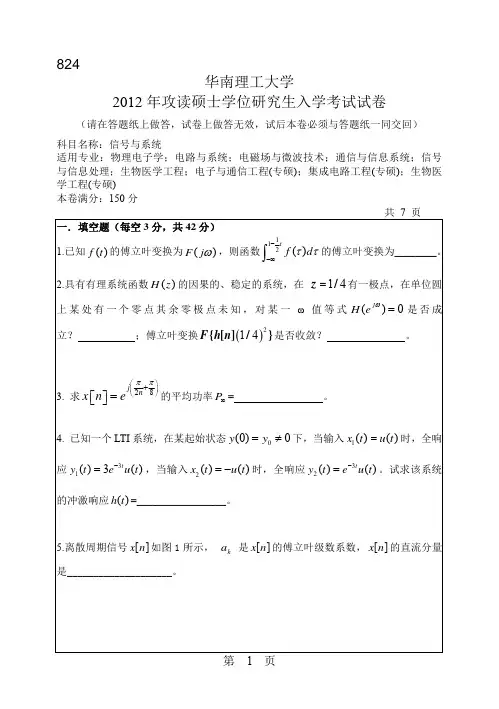
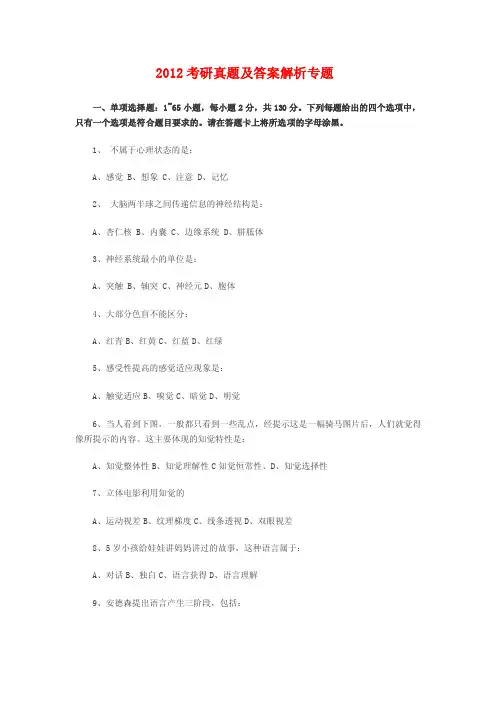
2012考研真题及答案解析专题一、单项选择题:1~65小题,每小题2分,共130分。
下列每题给出的四个选项中,只有一个选项是符合题目要求的。
请在答题卡上将所选项的字母涂黑。
1、不属于心理状态的是:A、感觉B、想象C、注意D、记忆2、大脑两半球之间传递信息的神经结构是:A、杏仁核B、内囊C、边缘系统D、胼胝体3、神经系统最小的单位是:A、突触B、轴突C、神经元D、胞体4、大部分色盲不能区分:A、红青B、红黄C、红蓝D、红绿5、感受性提高的感觉适应现象是:A、触觉适应B、嗅觉C、暗觉D、明觉6、当人看到下图,一般都只看到一些乱点,经提示这是一幅骑马图片后,人们就觉得像所提示的内容。
这主要体现的知觉特性是:A、知觉整体性B、知觉理解性C知觉恒常性、D、知觉选择性7、立体电影利用知觉的A、运动视差B、纹理梯度C、线条透视D、双眼视差8、5岁小孩给娃娃讲妈妈讲过的故事,这种语言属于:A、对话B、独白C、语言获得D、语言理解9、安德森提出语言产生三阶段,包括:A、构造、转化、执行B、概念化、公式化、发音C、构造、转化、发音D、概念化、公式化、执行10、在沙赫特和辛格的情绪唤醒模型中,对情绪产生起关键作用的因素是:A、注意B、认知C、生理变化D、情境11、人对同一个目的同时产生两种对应的动机是:A、双趋冲突B、双避冲突C、趋避冲突D、多重趋避冲突2.12、根据马斯洛的需要层次理论,人的需要从低级到高级的正确排序:A、生理需要、安全的需要、尊重的需要、归属与爱的需要、自我实现的需要B、生理需要、安全的需要、归属与爱的需要、尊重的需要、自我实现的需要C、生理需要、归属与爱的需要、安全的需要、尊重的需要、自自我实现的需要D、生生理需要、归属与爱的需要、尊重的需要、安全的需要、自自我实现的需要13、某生学业成绩好,但其他表现一般,根据斯滕伯格的成功智力理论,其在校表现优异智力是:A、分析性智力B、创造性智力C、实践智力D、综合性智力14、下列属于晶体智力的是:A、形成抽象概念的能力B、发现复杂关系的能力C、理解词汇能力D、知觉的速度15、最具核心意义的个性心理特点是:A、能力B、气质C、性格D、兴趣16、根据奥尔波特的人格特质理论,构成个体独特性的重要特质属于:A、首要特质B、中心特质C、根源特质D、共同特质17、根据人对问题思考的速度的差异,卡根等将认真风格类型划分为:A、场独立性与依存性B、冲动型与沉思型C、同时性与继时性D、整体加工与部分加工18、让吸烟上瘾的人扮演因吸烟患肺癌接受治疗,之后他戒了烟。
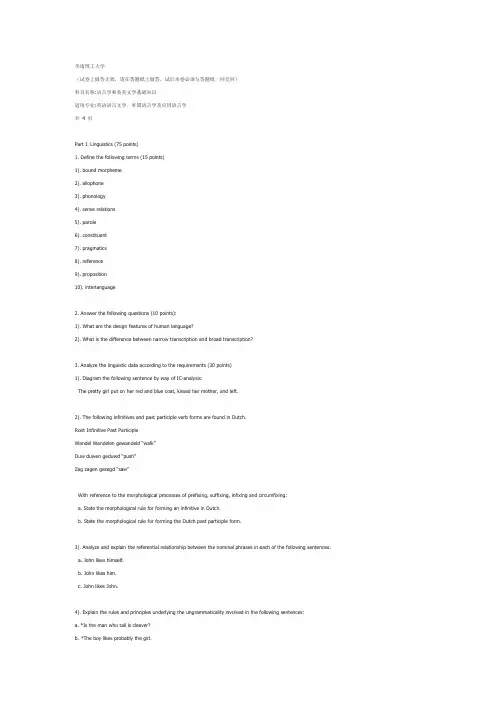
华南理工大学(试卷上做答无效,请在答题纸上做答,试后本卷必须与答题纸一同交回)科目名称:语言学和英美文学基础知识适用专业:英语语言文学、外国语言学及应用语言学共4页Part I. Linguistics (75 points)1. Define the following terms (15 points)1). bound morpheme2). allophone3). phonol ogy4). sense relations5). parole6). constituent7). pragmatics8). reference9). proposition10). interlanguage2. Answer the following questions (10 points):1). What are the design features of human language?2). What is the difference between narrow transcription and broad transcription?3. Analyze the linguistic data according to the requirements (30 points)1). Diagram the following sentence by way of IC-analysis:The pretty girl put on her red and blue coat, kissed her mother, and left.2). The following infinitives and past participle verb forms are found in Dutch.Root Infinitive Past ParticipleWandel Wandelen gewandel d “walk”Duw duwen geduwd “push”Zag zagen gezegd “saw”With re ference to the morphological processes of prefixing, suffixing, infixing and circumfixing:a. State the morphological rule for forming an infinitive in Dutch.b. State the morphological rule for forming the Dutch past participle form.3). Analyze and explain the referential relationship between the nominal phrases in each of the following sentences:a. John likes himself.b. John likes him.c. John likes John.4). Explai n the rules and principles underlying the ungrammaticality involved in the following sentences:a. *Is the man who tall is cleaver?b. *The boy likes probably the girl.c. *The doors were broke and the windows.4. Write on the following topics (20 points)1). Competent and performance2). Language Acquisition DevicePart II. Literature (75 points)1. Name a masterpiece of each o f the following authors (10 points)1). William Faulkner2). Thomas Hardy3). J. D. Salinger4). Arthur Miller5). D. H. Lawrence6). Doris Lessing7). Toni Morrison8). Eugene O’Neill9). T. S. Eliot10). Washington Irving11). William Golding12). E. M. Forster13). Kingsley Amis14). F. Scott Fitzgerals15). Emily Brontë16). George Eliot17). Bram Stoker18). John Buchan19). Herman Melville20). Edith Wharton2. Define the following terms in your own words (10 points)1). Expressionism2). Harlem Renaissance3). The New Criticism4). Expatriates5). Jazz Age3. Summarize the plots of two of the following works. (10 points)1). Oliver Twist2). Vanity Fair3). The Moonstone4). Sons and Lovers5). Absalom, Absalom!6). A Passage to India7). The Last of the Mohicans8). Farewell to Arms4. Answer the following questions (20 points)1). Who is the unnamed narrator of “A Rose for Emily” by William Faulkner? Why do you think the narrator uses we rather than I? How does the narrator represent the opinions of the townsfolk?2). Comments on Thomas Hardy’s The Ret urn of the Native.5. Literary interpretation (25 points)Read the following excerpt from Charles Dickens’s Hard Times and comment on the characteriza tion of the school principal.“Now, what I want is, Facts. Teach these boys and girls nothing but Facts. Facts alone are wanted in life. Plant nothing else, and root out everything else. You can only form the minds of reasoning animals upon Facts: nothing else will ever be of any service to them. This is the princi ple on which I bring up my own children, and this is the principle on which I bring up these children. Stick to Facts, sir!”The scene was a plain, bare, monotonous vault of a schoolroom, and the speaker’s square forefinger emphasized his observation s by underscoring every sentence with a line on th e schoolmaster’s sleeve. The emphasis was helped by the speaker’s square wall of a forehead, which had his eyebrows for its b ase, while his eyes found commodious cellarage in two dark caves, overshadowed by the wall. The e mphasis was helped by the speaker’s mouth, which was wide, thin, and hard set. The emphasis wa s helped by the speaker’s voice, which was inflexible, dry, and dictatorial. The emphasis was helped by the speaker’s hair, which bristled on the skirts of his bald head, a plantation of firs to keep the wind from its shining surface, all covered with knobs, like the crust of a plum pie, as if the head had scarcely warehouse-room for the hard facts stored inside. The speaker’s obstinate carriage, square coat, square legs, square shoulders—nay, his very neckcloth, trained to take him by the throat with an unaccommodating grasp, like a stubborn fact, as it was—all helped the emphasis.“In this life, we want nothing but Facts, sir; nothing but Facts!”The speaker, and the schoolmaster, and the third grown person present, all backed a little, and swept with their eyes the inclined plane of little vessels then and there arranged in order, ready to have imperial gallons of facts poured into them until they were full to the brim.。
628华南理工大学2012年攻读硕士学位研究生入学考试试卷(请在答题纸上做答,试卷上做答无效,试后本卷必须与答题纸一同交回)科目名称:中外美术史与设计史适用专业:设计学本卷满分:150分共2页一、填空:(任选十题,每题2分,共20分) (提示:多答只计前十题)1、被称为“吴门四家”的山水画家有唐寅、文徵明、 和 。
2、商代晚期已形成较完备的青铜器种类,分为 、 、 、 。
3、20世纪法国野兽主义的代表人物有: 、 等。
4、北京是清代修建最晚的大型皇家园林。
5、芬兰设计师安尼·努米斯尼米根据风格设计的服装与工业产品,被称为所谓的“芬兰风”。
6、日本通产省于1957年成立良好的设计选择系统以及优秀产品的级标记,旨在促进设计活动。
7、六七十年代,丹麦设计师约翰·鸟藏设计的澳大利亚 ,属于摆脱国际主义沉闷面貌的新设计风格。
8、包豪斯的奠基人 1907年为德国AEG设计了世界最早的完整的企业形象系统,德国最早的功能主义工业产品和AEG公司工厂建筑。
9、宋瓷中相传的“官、汝、、哥、”窑系,成为宋代五大名窑。
10、美国现代主义设计大师赖特1938年在匹兹堡设计的 住宅,是现代设计中的著名建筑。
11、《老人与海》属于___(国家)的动画作品,其作者是____。
12、 世界上第一部音画同步的有声动画片是____。
13、1939年,约翰·葛里逊成立加拿大国家电影局(简称NFB),该局以 “鼓励________、强调________,并维持小团队,紧密协同的工作”为发展策略。
14、20世纪60-80年代,曾经有两个国家的动画与处于垄断地位的迪斯尼动画有着截然不同的美学趣味和文化个性,在世界动画界引起广泛影响。
为了表彰他们对动画艺术的贡献,他们被冠以“学派”之称。
一个是中国的“中国动画学派”,一个是前南斯拉夫的“________” 。
二、名词解释(任选八题,每题5分,共40分)(提示:多答只计前八题)1、吴道子;2、巴罗克美术;3、唐代三彩俑;4、青花瓷;5、人机工程学;6、包豪斯;7、“装饰艺术”运动;8、解构主义;9、一拍一、一拍二;10、有限动画;11、摄影表;三、简答题(任选四题,每题15分,共60分)(提示:多答只计前四题)1.简述现代主义设计的内容与实质2.简述战后工业设计职业化和设计理论的发展3.简述迈克·格里夫斯的设计4.简述古奇Gucci时装品牌5、简述商代玉雕的艺术特色。
【育明教育】中国考研考博专业课辅导第一品牌育明教育官方网站:12012年华南理工大学考研真题答案精解之翻译硕士英语【育明教育】中国考研考博专业课辅导第一品牌育明教育官方网站:22015考研英语写作七大误区词汇与语法错误考研英语写作让很多同学都很头痛,有两点原因:一为词汇,二为语法。
因为英语与汉语的区别是一词多义,非常讲究用词准确而且正式。
同时,英语的词汇非常丰富,一个词语通常都有许多同义词和近义词。
考生如果平时注意积累并加以练习,就能够在考试中熟练地加以运用。
英文写作也同样非常讲究语法,尤其是考研作文作为正式文体,需要注意以下几点小细节:(1)尽量少用缩写形式。
如don't,can't,won't 应写为do not,cannot,will not 等。
(2)用更加正式的否定形式。
如not…any 应写为no,not…much 写为little,not many 写做few 等。
(3)尽量少用"etc.","and so on"等表达方式。
例如:Activities include dancing,singing,etc 。
Activities include dancing,singing,and other fun stuff 。
◎中文式思维模式很多考生在考试过程中把一些中文的成语、谚语翻译成英文,这种做法导致的结果就是文章不仅行文不符合英文的规律,读起来也让人觉得非常不舒服。
纠正中文思维习惯的关键依然在于培养英文语感,同时考生在平时的练习中也要尽量让自己用英文来思考。
如果考生需要用到谚语,名句等,最好的办法是直接掌握英文的谚语、名句,并灵活运用到文章中。
◎注意字数与标点考研英语作文一分钟平均7~8个字,字数多少算个够?自己目测一下,以大作文为例,中等大小一行15字,最起码写到12,13位置,因为阅卷人做的第一件事情就是看你的字数,就看你的位置到没有到。
870
华南理工大学
2016年攻读硕士学位研究生入学考试试卷
(试卷上做答无效,请在答题纸上做答,试后本卷必须与答题纸一同交回)
科目名称:语言学和英美文学基础知识
适用专业:英语语言文学、外国语言学及应用语言学
870
华南理工大学
2017年攻读硕士学位研究生入学考试试卷
(试卷上做答无效,请在答题纸上做答,试后本卷必须与答题纸一同交回)
科目名称:语言学和英美文学基础知识
适用专业:英语语言文学;外国语言学及应用语言学
870
华南理工大学
2018年攻读硕士学位研究生入学考试试卷
(试卷上做答无效,请在答题纸上做答,试后本卷必须与答题纸一同交回)
科目名称:英语语言文学综合
适用专业:外国语言文学。
870华南理工大学2012年攻读硕士学位研究生入学考试试卷(请在答题纸上做答,试卷上做答无效,试后本卷必须与答题纸一同交回)科目名称:语言学和英美文学基础知识适用专业:英语语言文学;外国语言学及应用语言学本卷满分:150分共7页Part OneFundamentals of Linguistics and Literature(英语语言文学和外国语言学及应用语言学考生共答部分)I. Define the following terms in your own words (20 points)1. morpheme2. hyponymy3. language variety4. relation maxim5. metaphor6. Romanticism7. Sentimentalism8. Metaphysical poetry9. Free verse10. Lost GenerationII. Answer the following questions (30 points)1. How to classify errors in terms of their sources?2. What is the significance of Saussure’s distinguishing between langue and parole?3. Why [p, p h] are taken as allophones of the same phoneme /p/?4. What is the stream-of-consciousness novel?5. What is the significance of The Canterbury Tales by Geoffrey Chaucer?6. Why is Romanticism considered the greatest poetic movement in British literature?Part TwoTest for Students of Linguistics and Applied Linguistics(仅供外国语言学及应用语言学考生用,英语语言文学考生不作答)I. Discuss and comment on the following topics (40 points)1. transcription of speech sounds2. inflectional morphology and differences between languages3. universal grammar and specific grammars4. the meaning of meaningII. Analyze the Language data according to the requirements (60 points)1. Explain the following sentence by way of IC-analysis (15 points):Go and ask Mr. Smith who is sitting by the window.2. Analyze the following speech event in terms of the related pragmatic theory (10points):Mary: Do you like rugby?Tony: I am a New Zealander.3. Explain the rules and principles underlying the ungrammaticality or inappropriatenessinvolved in the following sentences (20 points):a. * I’m grateful to Professor Smith for providing me food and accommodationduring my visit to Harvard University.b. * Hearing the shouting, David saw the birds flying away immediately.4. Analyze the following passage in terms of the related stylistic theory (15 points):If you prick us, do we not bleed? If you tickle us, do we not laugh? If you poison us, do we not die? And if you wrong us, shall we not revenge?(William Shakespeare, The Merchant of Venice, II. ix)Part ThreeTest for Students of English Language and Literature(仅供英语语言文学考生用,外国语言学及应用语言学考生不作答)I. Discuss and comment on the following topics (40 points)1. What led to the rise of American Realism?2. What are the major themes of modernist literature?3. Comment on the historical development of sonnet as a poetic form.4. Discuss the characteristics of Edgar Allan Poe’s poems.II. Analysis and appreciation (60 points)1. Please read the following excerpt from Tess of D’Urbervilles by Thomas Hardy, and analyze it in a 200-word essay. (30 points)Chapter 35Clare performed the irrelevant act of stirring the fire: the intelligence had not even yet got to the bottom of him. After stirring the embers he rose to his feet: all the force of her disclosure had imparted itself now. His face had withered. In the strenuousness of his concentration he treaded fitfully on the floor. He could not, by any contrivance, think closely enough; that was the meaning of his vague movement. When he spoke it was in the most inadequate, commonplace voice of the many varied tones she had heard from him.“Tess!”“Yes, dearest.”“Am I to believe this? From your manner I am to take it as true. O you cannot be out of your mind! You ought to be! Yet you are not. … My wife, my Tess ─ nothing in you warrants such a supposition as that?”“I am not out of mind,” she said.“And yet —” He looked vacantly at her, to resume with dazed senses: “Why didn’t you tell me before? Ah, yes ─you would have told me —in a way; but I hindered you.I remember!”These, and other of his words, were nothing but the perfunctory babble of the surface while the depths remained paralyzed. He turned away, and bent over a chair. Tess followed him to the middle of the room where he was, and stood there staring at him with eyes that did not weep. Presently she slid down upon her knees beside his foot, and from this position she crouched in a heap.“In the name of our love, forgive me!” she whispered with a dry mouth. “I have forgiven you for the same!”And, as he did not answer she said again;“Forgive me as you are forgiven! I forgive you, Angel.”“You, — yes, you do.”“But you do not forgive me?”“O Tess, forgiveness does not apply to the case. You were one person: now you are another. My God — how can forgiveness meet such a grotesque — prestidigitation as that!”He paused, contemplating this definition; then suddenly broke into horrible laughter — as unnatural and ghastly as a laugh in hell.“Don’t — don’t! It kills me quite, that!” she shrieked. “O have mercy upon me — have mercy!”He did not answer; and, sickly white, she jumped up. “Angel, Angel? What do you mean by that laugh?” she cried out. “Do you know — what this is to me?”He shook his head.“I have been hoping, longing, praying, to make you happy! I have thought what joy it will be to do it, what an unworthy wife I shall be if I do not! That’s what I have felt, Angel?”“I know that.”“I thought, Angel, that you loved me — me, my very self! If it is I you do love, O how can it be that you look and speak so? It frightens me! Having begun to love you, I love you for ever — in all changes, in all disgraces, because you are yourself. I ask no more. Then how can you, O my own husband, stop loving me?”“I repeat, the woman I have been loving is not you.”“But who?”“Another woman in your shape.”…“Angel,” she said suddenly in her natural tones, the insane dry voice of terror having left her now. “Angel, am I too wicked for you and me to live together?”“I have not been able to think what we can do.”“I shan’t ask you to let me live with you, Angel; because I have no right to. I shall not write to mother and sisters to say we be married, as I said I would do. And I shan’t finish the good-hussif’ I cut out and meant to make while we were in lodgings.”“Shan’t you?”“No, I shan’t do anything, unless you order me to. And if you go away from me I shall not follow’ee; and if you never speak to me any more I shall not ask why, unless you tell me I may.”“And if I do order you to do anything?”“I will obey you, like your wretched slave, even if it is to lie down and die.”…But she went on pleading in her distraction; and perhaps said things that would have been better left to silence. “Angel, Angel: I was a child — a child when it happened! I knew nothing of men.”“You were more sinned against than sinning, that I admit.”“Then will you not forgive me?”“I do forgive you. But forgiveness is not all.”“And love me?”To this question he did not answer.“O Angel — my mother says that it sometimes happens so — she knows several cases when they were worse than I, and the husband has not minded it much — has got over it, at least. And yet the woman has not loved him as I do you.”“Don’t, Tess; don’t argue. Different societies different manners. You almost make me say you are an unapprehending peasant woman, who have never been initiated into the proportions of social things. You don’t know what you say.”“I am only a peasant by position, not by nature!”…“During the interval of the cottager’s going and coming she had said to her husband, “I don’t see how I can help being the cause of much misery to you all your life. The river is down there: I can put an end to myself in it. I am not afraid.”“I don’t wish to add murder to my other follies,” he said.“I will leave something to show that I did it myself — on account of my shame. They will not blame you then.”“Don’t speak so absurdly — I wish not to hear it. It is nonsense to have such thoughts in this kind of case, which is rather one for satirical laughter than for tragedy. You don’t in the least understand the quality of the mishap. It would be viewed in the light of a joke by nine-tenths of the world, if it were known. Please oblige me by returning to the house and going to bed.”“I will,” said she dutifully.…Having nothing more to fear, having scarce anything to hope, for that he would relent there seemed no promise whatever, she lay down dully. When sorrow ceases to be speculative sleep sees her opportunity. Among so many happier moods which forbid repose this was a mood which welcomed it, and in a few minutes the lonely Tess forgot existence, surrounded by the aromatic stillness of the chamber that had once, possibly, been the bride-chamber of her own ancestry.Later on that night Clare also retraced his steps to the house. Entering softly to thesitting-room he obtained a light, and with the manner of one who had considered his course he spread his rugs upon the old horse-hair sofa which stood there, and roughly shaped it to a sleeping-couch. Before lying down he crept shoeless upstairs, and listened at the door of her apartment. Her measured breathing told that she was sleeping profoundly.“Thank God!” murmured Clare; and yet he was conscious of a pang of bitterness at the thought — approximately true, thought not wholly so — that having shifted the burden of her life to his shoulders she was now reposing without care.…The check was sufficient. He resumed his retreat and descended.His air remained calm and cold, his small compressed mouth indexing his powers of self-control; his face wearing still that terribly sterile expression which had spread thereon since her disclosure. It was the face of a man who was no longer passion’s slave, yet who found no advantage in his enfranchisement. He was simply regarding the harrowing contingencies of human experience, the unexpectedness of things. Nothing so pure, so sweet, so virginal as Tess had seemed possible all the long while that he had adored her, up to an hour ago; butThe little less, and what worlds away!He argued erroneously when he said to himself that her heart was not indexed in the honest freshness of her face; but Tess had no advocate to set him right. Could it be possible he continued that eyes which as they gazed never expressed any divergence from what the tongue was telling, were yet ever seeing another world behind her ostensible one, discordant and contrasting.He reclined on his couch in the sitting-room, and extinguished the light. The night came in, and took up its place there, unconcerned and indifferent; the night which had already swallowed up his happiness, and was now digesting it listlessly; and was ready to swallow up the happiness of a thousand other people with as little disturbance or change of mien.2. The following is a poem written by Alfred Tennyson. Write an analytic essay on it in about 250 words. (30 points)Break, break, break,On thy cold gray stones, O sea!And I would that my tongue could utterThe thoughts that arise in me.O, well for the fisherman’s boy,That he shouts with his sister at play!O, well for the sailor lad,That he sings in his boat on the bay!And the stately ships go onTo their haven under the hill;But for touch of a vanish’d handAnd the sound of a voice that is still!Break, break, break,At the foot of thy crags, O Sea!But the tender grace of the day that is dead Will never come back to me.。